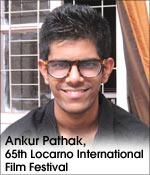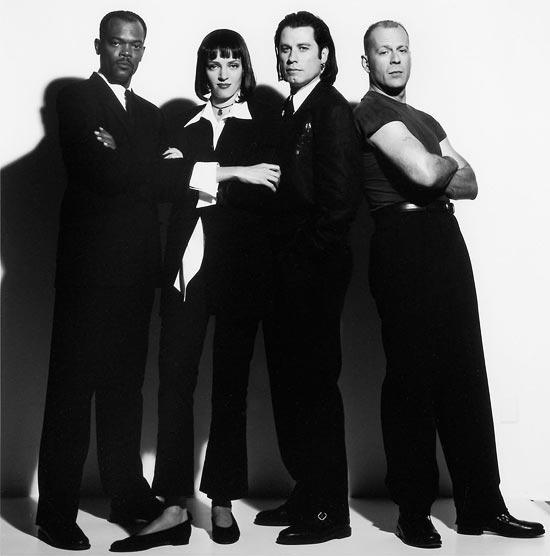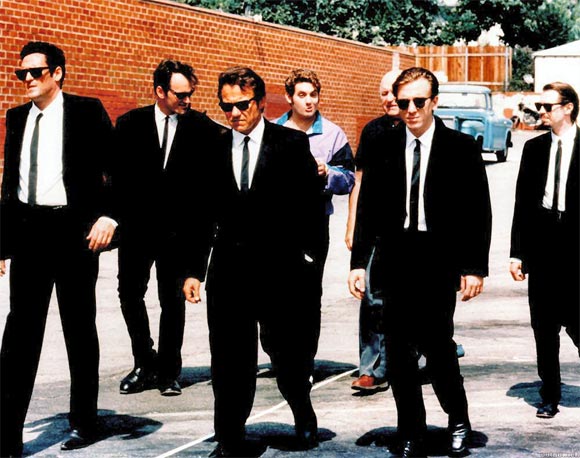Image: A scene from Pulp Fiction
Ankur Pathak in Locarno
Ankur Pathak in Locarno
 Oscar-winning director-screenwriter Roger Avary -- who co-wrote the ground-breaking Pulp Fiction (1994) besides directing The Rules of Attraction (2002) and Killing Zoe (1994) -- talks at length about the cult movie, and hiring a man who would visit a video store and stank a lot, and would later go on to be known as Quentin Tarantino.
Oscar-winning director-screenwriter Roger Avary -- who co-wrote the ground-breaking Pulp Fiction (1994) besides directing The Rules of Attraction (2002) and Killing Zoe (1994) -- talks at length about the cult movie, and hiring a man who would visit a video store and stank a lot, and would later go on to be known as Quentin Tarantino.
Avary is currently serving as a jury member at the 65th Locarno International Film Festival, Switzerland.
When I was young, I picked up a job at a video rental library as I was friends with the owners. There was this one guy who would keep coming to the store. He smelt really bad.
He knew almost everything about the movies. That annoyed me because I thought I was the one who knew everything about the movies.
His knowledge was so vast that it was crazy. He was hired by the rental video library.
His name was Quentin Tarantino.
In the beginning, we had this sort of rivalry. I don't think we liked each other then. As co-workers in the store, we didn't care about hiring out the big films to people. Instead, the idea was to push rare experimental films to the public and Quentin and I fought over the title that would be on display to attract people.
It was like a film school. We would put out a movie -- Quentin usually liked the exploitative or Kung fu cinema while I would pick a Kubrick title. We would discuss, debate, and deconstruct a film and every now and then a customer would see this and join in the conversation.
I was more European art house, and he was into Hong Kong martial arts. Initially, he had this impression that I was just a local beach boy living in California. But cinema united us and so we became great friends.
'Quentin had this bad urge to act; he wanted the biggest recognition as an actor'
Image: A scene from Pulp FictionSoon, both of us started writing and would share, rewrite and edit each other's work. It became an incredible bond.
He wrote this screenplay called My best friend's birthday. It was a screwball comedy where this guy wants to give his best friend the best birthday ever but ends up catastrophically messing things up.
Quentin acted in it while I was the cinematographer. He had this bad urge to act, and let me tell you, he wanted the biggest recognition as an actor.
This was a very small budget movie so we shot it on 16 mm using reversal film, not even negative film. We never finished the movie. I went away to school, he continued to work at the video store, but we both kept writing.
I always wanted to be a director. The only reason I became a writer was out of necessity. It is cheaper to write your own stuff than to hire somebody else to do it for you.
Some months later, I wrote a screenplay called The Open Road. It was about a journalist who visits this town that is trapped in hell. Quite like the film After Hours. It was 65 pages, and to meet Hollywood standards, you usually have to have at least 120 pages of writing.
I showed it to Quentin and he loved it. He told me to pursue it and write more, but I said I was done with it.
The truth was I wanted to do something else. Quentin liked it so much that he asked me whether I could give it to him and to re-write it, maybe expand it in some way or make it better. I agreed since at that time we were very good friends and loved cinema and shared almost everything about it.
'I found myself crying after reading True Romance'
Image: Quentin Tarantino on the True Romance screenplay posterIt must have been another six months when Quentin emerged from his room -- this shabby place where he would live and breathe movies (and sleep only on a mattress) with heavy hand-written literature.
He held in his hand what would soon become True Romance, parts of Natural Born Killers, Reservoir Dogs and, yes, Pulp Fiction.
He went on to add stories within stories within stories from the source material that I had given him. It was a struggle to read it because Quentin is not formally trained. And he has horrible handwriting.
After reading through it, I found myself crying. I hadn't read anything more beautiful than that screenplay at that point in time.
I told him, "Quentin, we need to trim it down. It is way too much." This must be around the years 1983-1984.
After cutting it down, the screenplay became what we now know as True Romance. Our idea was to follow the Cohen brothers. Quentin would direct, I would produce. But for this we needed the finance.
Our video store was in an upper class locality in California. I went through the database and started rounding up all the wealthy people from the locality like doctors and lawyers. Spike Lee had done the same thing.
The people were confused. Why did video store guys want to make movies? They didn't understand. We met a Hollywood attorney who said he would get us a million dollars.
We believed him and partied and that was the biggest mistake ever committed. Because we stopped trying after his promise, which never was realised.
For two years nothing happened. Eventually Quentin sold the screenplay to someone else (the studio that produced True Romance). We were then back to working on short films because they were easier to make.
At that point, anthology films were very popular. So Quentin and I wrote two short stories and asked director Adam Rifkin to write one too. Quentin did and so did I, something that would go on to become 'The Gold Watch' in Pulp Fiction. Adam did not. To date he regrets that and whenever I see him, he goes, "Damn, I could have been a part of the legacy of Pulp Fiction!"
'Quentin asked me to play Mr Orange in Reservoir Dogs, which later Tim Roth did'
Image: A scene from Reservoir DogsLater, Quentin got the opportunity to direct Reservoir Dogs through some contacts he had made. I was there on the sets the entire time, made the film's logo etc. When you are friends and filmmakers, you go to any extent to help your friend.
He asked me to play Mr Orange because I was very good at pretending that I have been shot in the stomach. But, of course, I couldn't do it and the role eventually went to Tim Roth.
After the crazy, unexpected success of that movie, he was given the liberty to do almost anything. He knew we had a bank of scripts back home. Something that I called Pandemonium Reigns. We decided to work together.
Quentin had never been outside the States, while I had travelled to Europe. He told me, "Let's go to Amsterdam. I want to get Amsterdamned". And we were set.
We took all the writing material, unused parts of True Romance, my Pandemonium Reigns, besides others, and rented a room by one of the canals.
The idea was to write scenes that are able to exist on their own, something that an actor can independently perform without a connection to the next scene. It was a conscious decision to have no transitions at all, only abrupt jump cuts from one story to the other.
In that sense, we never really were creating anything. Everything that we wrote was a reaction to what was happening in cinema at that point in time. We had just come out of the 1980s and the films had become homogenous. We were longing for the 1970s. The idea was to break through and come out radically different.
All the scenes that we wrote in Amsterdam along with previous writings were laid on the floor as we thought how best to connect these stories.
And that is how, on the floor, Pulp Fiction -- one of the greatest films of all time -- was born.





Comment
article